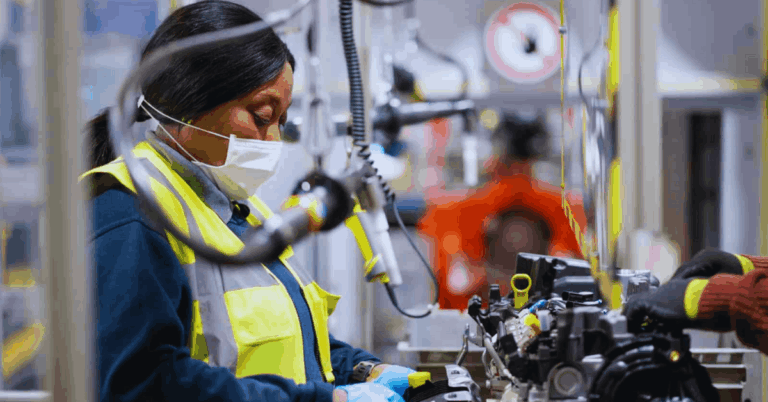If you’re interested in launching a career in the food production sector, you’ve come to the right place.
This article explores how to apply for food manufacturing jobs from top companies, giving you a clear view of the available roles in the U.S., employee benefits, reasons to apply, job requirements, and a step-by-step application process.
Let’s get started and help you secure a rewarding career.
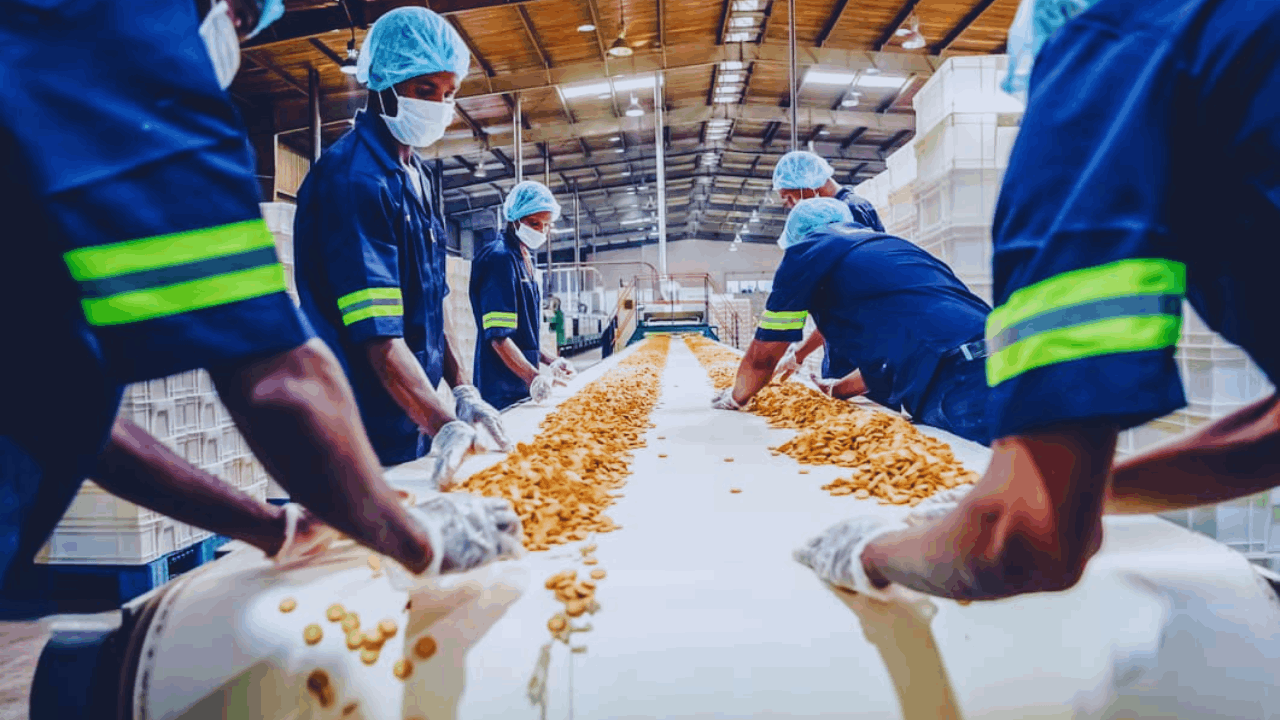
Available Manufacturing Jobs in the U.S.
Food manufacturing offers various roles across production, quality control, and engineering departments.
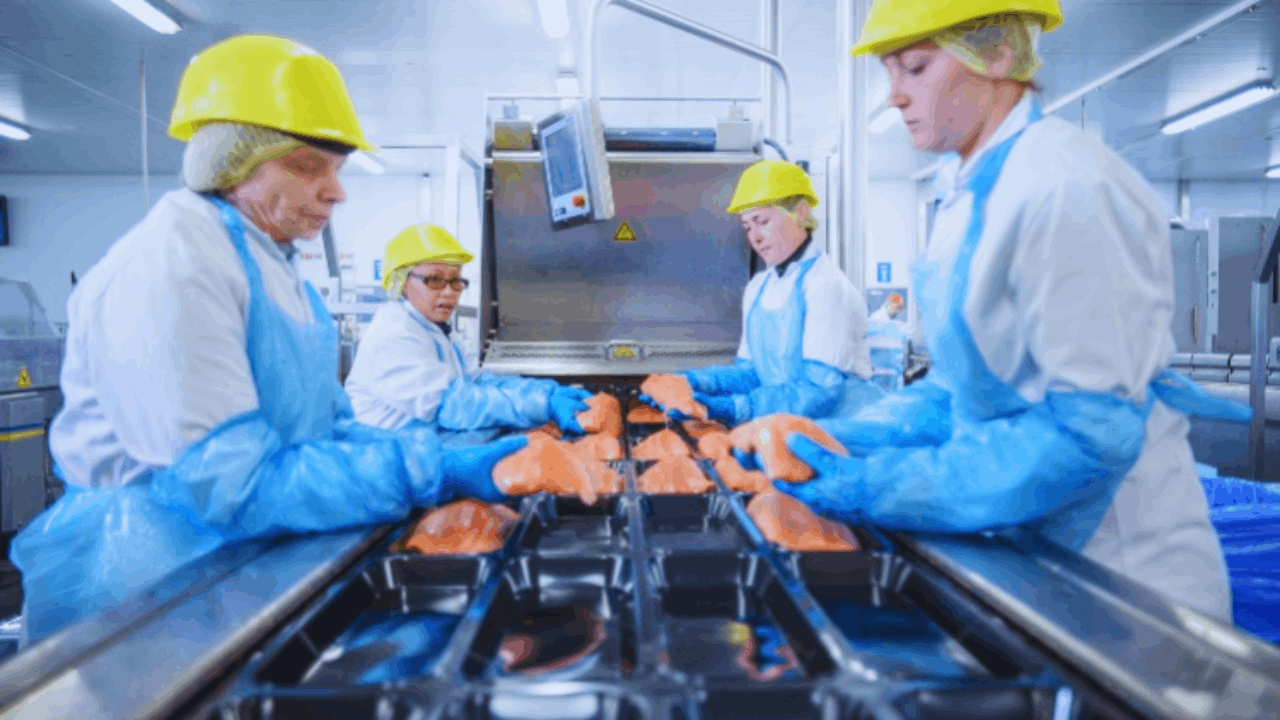
These positions cater to various skill levels, from entry-level operators to technical specialists and supervisors.
Let’s explore the most common jobs available in this sector and the companies hiring now.
Common Production and Equipment Roles
You can find roles like machine operators, production associates, and packaging specialists in plants run by major companies such as Tyson Foods, General Mills, Conagra, and Ingredion.
These positions involve running food processing equipment, monitoring production lines, and checking packaging. Many are entry-level and require only a high school diploma or equivalent.
Shifts are often 24/7, so companies hire for day, night, and weekend rotations. These roles keep production moving smoothly and are the backbone of the industry.
Quality, Safety, and Engineering Positions
Work like quality assurance technicians, food safety directors, and food scientists is in demand. These roles include inspecting products, overseeing food safety regulations, and analyzing ingredients.
Scientific roles like flavorists and refrigeration engineers earn higher pay, sometimes reaching up to $150,000 annually.
These positions usually require technical training or relevant degrees. They are essential for maintaining product quality and meeting industry standards.
Supervisory and Continuous Improvement Jobs
Supervisor roles and continuous improvement specialists help lead teams and optimize operations. These positions require leadership and problem-solving skills.
They serve as paths into management for those who enjoy guiding production improvements.
With continuous investment in new technologies, there’s always a need for talent in these positions. Strong communication skills and a passion for innovation are key to success here.
Employee Benefits of Manufacturing Jobs
Before applying, it’s helpful to understand the benefits that come with food manufacturing jobs.
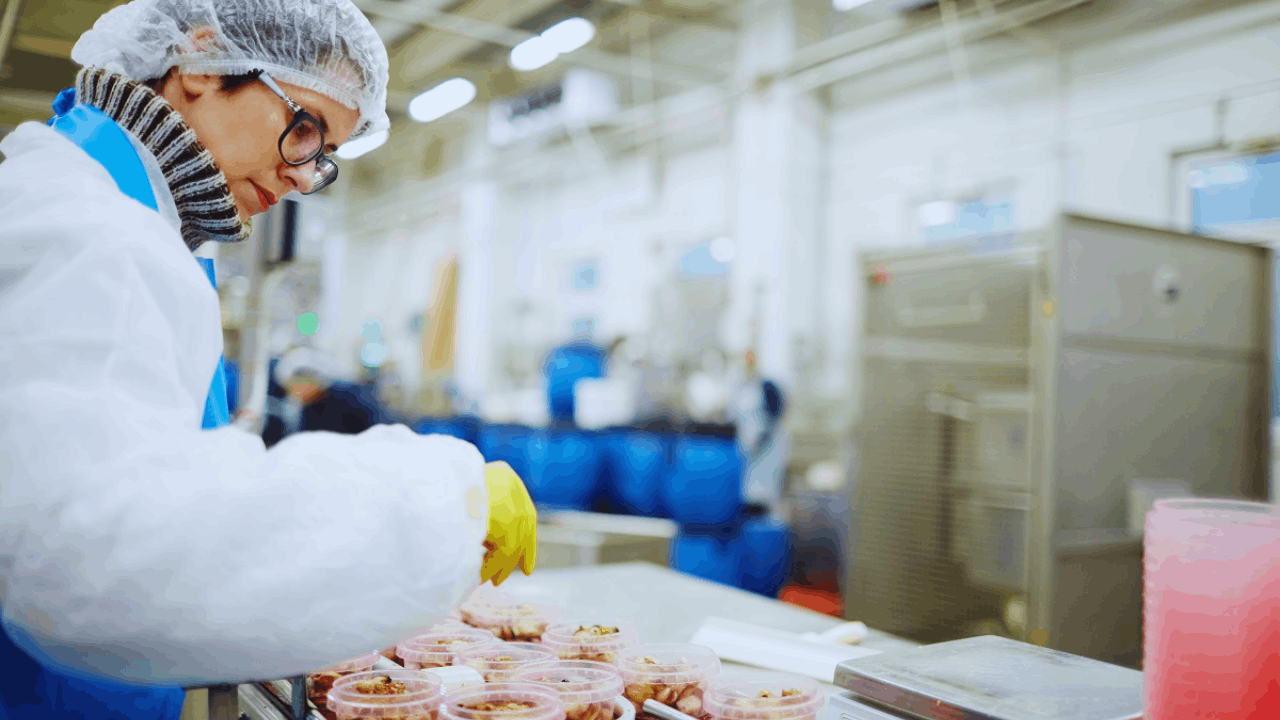
Many companies offer competitive health plans, leave policies, and career advancement opportunities.
Let’s dive into the specific benefits that make these positions attractive.
Health and Insurance Packages
Around 91% of food manufacturers offer medical insurance, which is well above the national average.
Life insurance is also common and provided by 81% of employers. These benefits help you manage medical expenses and offer financial security for your family.
Many companies also provide dental and vision insurance, adding to the comprehensive healthcare support.
Disability, Leave, and Retirement
Many companies provide short- and long-term disability insurance, 65% and 49%, respectively.
Paid and unpaid family leave options are available, although less common. Retirement plans and 401(k) matches are increasingly offered to help employees save for the future.
Some employers even provide pension options, helping to ensure financial security long after you retire.
Learning Opportunities and Stability
Many food manufacturing companies invest in employee training and career growth, emphasizing long-term retention.
Large firms like Siemens, Tyson, and Anheuser-Busch offer training programs and apprenticeships. This focus on development ensures you have a pathway to grow within the industry.
Access to mentorship programs and tuition assistance can also help you expand your skills and advance your career.
Reasons to Apply for Manufacturing Jobs
With so many opportunities available, you might wonder why food manufacturing is such a popular choice.
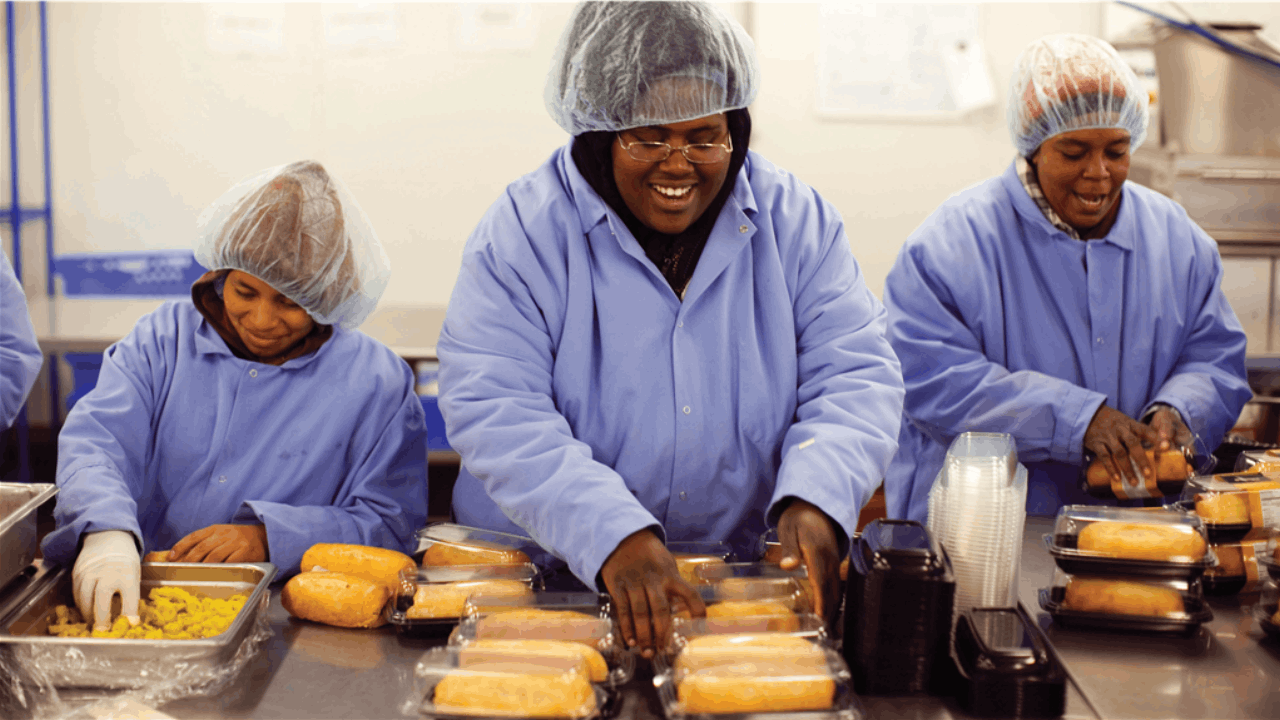
Job seekers are drawn to this industry for its stability, competitive pay, and potential for advancement.
Here’s why you should consider applying for a manufacturing job now.
Strong Job Market Growth
Food manufacturing jobs grew 6.6% between 2017 and 2022 and are forecasted to grow another 8% by 2027.
Employment in this sector has increased by 10% since 1979, making it one of the few growing manufacturing industries. These trends highlight long-term job security and opportunities for advancement.
Consumer demand, technological advances, and increased focus on food safety drive growth.
Competitive Wages and Economic Impact
Average salaries range around $100,000 per year for full-time roles. Specialized positions like food scientists or flavorists may reach up to $150,000 annually.
Manufacturing also supports regional economies, with every dollar spent generating up to $2.64 in overall impact.
This sector is a critical part of the national economy, supporting jobs in agriculture, transportation, and logistics as well.
Accessible Without a Degree
Many entry-level roles do not require a college degree. These positions offer a stable career path with upward mobility through training and promotion.
This makes it easier for you to get started and build a rewarding career. On-the-job training is often available, helping you develop essential skills while earning a steady paycheck.
Reshoring and Long-Term Demand
Reshoring trends and federal incentives are expanding U.S. food production lines. Companies continue to invest in modern facilities, which signals a steady demand for workers.
This means reliable job opportunities now and in the future. With increasing investment in automation and sustainable practices, the future of food manufacturing looks bright.
Requirements for Food Manufacturing Jobs
Understanding job requirements is crucial before you submit your application.
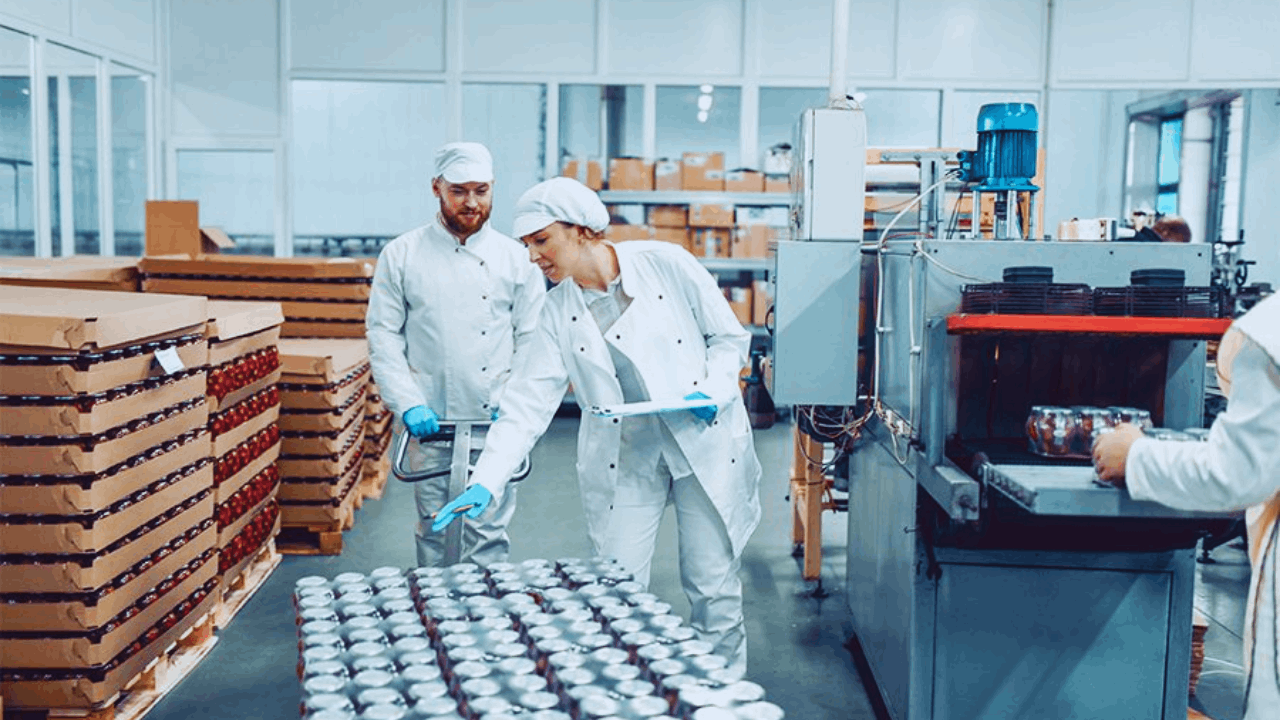
Food manufacturing companies look for specific skills and qualifications that align with production and safety standards.
Let’s review the main requirements you’ll need to meet.
Educational and Licensing Needs
Basic roles may require a high school diploma or GED. Specialized jobs, such as food scientists or refrigeration engineers, typically require technical training or a relevant degree.
Certifications such as HACCP or PCQI are helpful in quality and safety roles. Additional training, like OSHA certification, can also boost your qualifications.
Technical and Soft Skills
Operators need machine operation skills and awareness of safety regulations. Quality assurance or safety roles require attention to detail and the ability to monitor standards.
Leadership positions need communication and supervisory skills. Many companies value soft skills and a willingness to learn over direct experience.
Physical Capability and Safety Knowledge
Most jobs require being on your feet, lifting up to 50 pounds, and following safety and hygiene protocols. Understanding current Good Manufacturing Practices (cGMPs) and FDA guidelines is valuable.
These skills help ensure product safety and compliance with regulations. Wearing proper personal protective equipment (PPE) is also essential.
Background Checks and Health Screenings
Expect drug tests, criminal background checks, and physical exams before being hired. Safety-sensitive jobs may require hearing and vision checks to ensure you meet workplace safety standards.
These steps help maintain a safe and reliable workforce. Some companies may also ask for proof of immunizations to meet food safety requirements.
Steps on How to Apply for Manufacturing Jobs
Once you understand the requirements and benefits, it’s time to apply for your next opportunity.

A structured approach can help you stand out to top employers and secure a position that matches your skills and goals. Follow these steps to apply effectively for food manufacturing jobs.
Identifying Companies and Roles
Start by researching employers like Tyson Foods, General Mills, Conagra, Ingredion, and Monogram Foods.
Visit their career portals or use job sites like Indeed and ZipRecruiter to search for “food manufacturing” jobs.
Explore positions that match your skills and interests. Consider attending job fairs or virtual hiring events to network with recruiters.
Tailoring Your Resume and Preparing References
Highlight relevant skills like machinery operation, safety protocols, or supervisory experience. For technical roles, include education and certifications.
Adding references or performance examples can strengthen your application. Keep your resume concise and focused on accomplishments that demonstrate your value.
Submitting Applications
Use company career portals to apply directly for roles that interest you. Many companies offer one-click application features on job boards, making the process efficient and straightforward.
Be sure to complete all required sections and double-check for errors. Upload a tailored cover letter to stand out among other applicants.
Preparing for Interviews
Expect questions about production processes, safety situations, and problem-solving scenarios. Be ready to discuss your career goals and ask about company culture and development opportunities.
Practice answering questions concisely and confidently. Remember to dress appropriately and arrive on time for interviews, whether in person or virtual.
Completing Onboarding and Training
Once hired, you’ll go through orientation and safety training. Companies will train you on equipment operation, sanitation, and regulatory protocols.
This onboarding process ensures you’re prepared for success in your new role. During this time, build relationships with colleagues and supervisors to integrate smoothly into the team.
Conclusion
Jobs in food manufacturing continue to expand, offering a diverse range of roles across production, quality, and engineering.
By targeting the right employers, tailoring your application, and following these steps, you’ll be ready to apply for manufacturing jobs from top companies with confidence. Start building your future in food manufacturing today.



